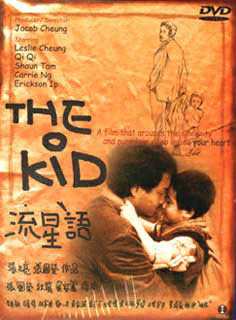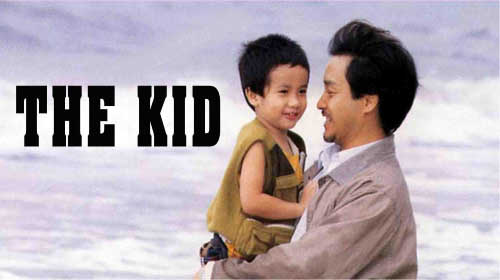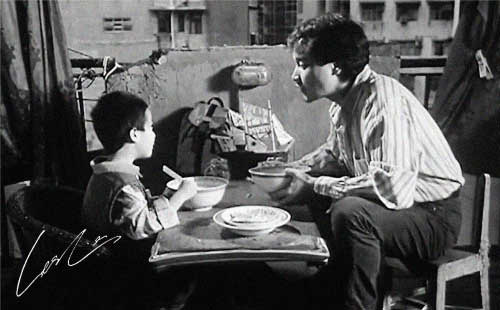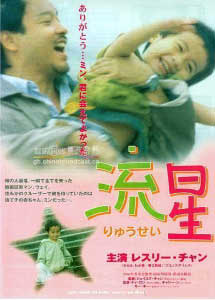

In writing about this 1999 Jacob Cheung work, this interested reader of others' movies reviews -- as well as avid viewer of movies -- is trying hard to do what she does not like critics to do: That is, let their ideological disagreements with the film maker(s) get in the way of her fair assessment of a particular cinematic offering. This is not least because even while I was thoroughly dissatisfied with the choice of conclusion for this drama, I very much appreciated the method of -- and very -- presentation of many of the social dilemmas and personal choices in the rest of the production.
THE KID takes its inspiration from the 1921 Charlie
Chaplin-Jackie Coogan silent classic of the same name. While this is
indeed so, there are many things about the effort that stars the still boyish-looking
Leslie Cheung -- as a fund manager named Wing who lost his fortune (and that
of many of his clients) in a single day during the last Asian Financial Crisis
-- and a little tyke named Erickson Yip Tuen-Lam -- as the abandoned child
named Ming who became his companion in that same twenty-four hour cycle --
which make it very recognizably a Hong Kong movie. In fact, one could
go so far as to state that this film is as much a love letter to the territory
and its "common folk" as "Lost and Found" and "C'est la Vie, Mon Cherie":
Sentimental works which touchingly reveal to us many of the less glamorous,
older looking, working-class -- yet not necessarily triad- and vice-filled
-- sections of the former British crown colony.

After showing us the circumstances by which Wing and Ming made their acquaintance, THE KID fast-forwards four years or so into the future. There, Wing has become a scruffy oddjob man who subsists on temporary and other jobs that he finds here, there and everywhere around Hong Kong while Ming is alternately his shadow, help, play-mate and beloved adopted son. Among those that this duo have as their neighbors and count as their friends are a middle-aged beat-cop whose love for a woman who everyone calls Elder Sister Lan is obvious to all except her (Veteran actor Ti Lung and an amazingly haggard as well as plain-looking Carrie Ng deserve the Best Supporting Actor and Actress Awards they have garnered for their sensitive portrayals of these two surprisingly charming individuals).
Into their not necessarily carefree but still
not unhappy lives comes a rich and beautiful do-gooder whose phobia of children
stems from her regret at having abandoned her child a few years ago.
Although I found the debut-making Qi Qi (an internationally famous model
and Mrs. Simon Yam in real life) rather sweet as well as immensely pleasing
to the eye, the bulk of my problems with THE KID emanate from her character
and what she is given to represent. Specifically, while I certainly
can grant that rich people are not necessarily evil nor uncaring folk, I
have to say that I seem to be much less convinced than director Jacob Cheung
(and this movie's scriptwriter) that money can buy and guarantee happiness
for the young, old and those in between. As such, while I am happy
that the Communist Chinese rulers of the formally designated Special Administrative
Region continue to allow the making of films with this kind of message (and
point of view), I also can't help but think that this is definitely one of
those Hong Kong movies that plays best in that territory and is unlikely
to find an appreciative audience outside of it and a few (other) highly capitalist
plus "traditional" family-oriented societies (e.g., those of Singapore and
Taiwan).

This is all the more frustrating because there really are some very nice moments and scenes in this not at all badly made film. Among those that ought to be cherished are that which well illustrate the care that the policeman has for the people whose welfare he considers his duty to look after as well as his long-time acquaintance, Elder Sister's Lan good treatment of the elderly folk who share her home plus Wing and Ming's devotion to each other. What a pity that I absolutely can't feel the same way about the eventual fates of Wing and Ming, and the woman who we last see leaving the scene in her Rolls Royce.
This non-Hong Konger's rating for the film:
6.5
